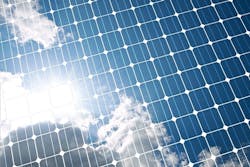Virginia DEQ Issues Memo Regarding Solar Panels & Storm Water Runoff
The Virginia Department of Environmental Quality (DEQ) will be implementing a stronger post-development storm water management policy for solar projects.
According to the memo, this policy is subject to Virginia Stormwater Management Program (VSMP) requirements.
Before this decision, according to the memo, Virginia’s DEQ has “not required solar projects to account for the imperviousness of the solar panels when applying the Commonwealth’s post-development storm water management technical criteria.”
The memo adds that: “The U.S. EPA Chesapeake Bay Program considers the solar panels to be impervious areas for the purposes of performing water quality modeling/calculations for the Chesapeake Bay Total Maximum Daily Load.”
The new policy will go into effect immediately, which includes all storm water management plans not approved prior to the date of the memorandum, according to the memo.
The policy will maintain downstream waterways and properties as well as ensure consistency with EPA’s Chesapeake Bay Program. A second memo was published to clarify further, which notes that the policy impacts existing regulations for solar projects regarding impervious surfaces and includes the solar panels as well as the base posts. The policy prioritizes water quality and quantity.
DEQ’s initial practice considered only the solar panel support posts and beams as impervious areas when performing rainfall-runoff calculations. According to the memo, this approach may underestimate the post development runoff volume or runoff rate from solar panel arrays.
- Water Quantity: Solar panels are to be considered unconnected impervious areas when performing post-development water quantity calculations using the hydrologic methods specified in the Virginia Stormwater Management Program Regulation, 9VAC25-870-72. Current information regarding the application of unconnected impervious areas can be found in Chapter 9 (Hydrologic Soil-Cover Complexes), Part 630 (Hydrology) of the Natural Resource Conservation Service’s National Engineering Handbook.
- Water Quality. Solar panels are to be considered impervious areas when performing post-development water quality calculations using the Virginia Runoff Reduction Method (VRRM). To account for the disconnection of the solar panels from the overall drainage system, the area of the solar panels may be entered into the applicable “Simple Disconnection” stormwater best management practices section of the VRRM compliance spreadsheet (i.e., 2a – Simple Disconnection to A/B Soils or 2b – Simple Disconnection to C/D Soils).
- Alternative Methods. This policy does not prohibit any alternative method. If alternative proposals are made, such proposals will be reviewed and accepted or denied based on their technical adequacy and compliance with the appropriate laws and regulations.
DEQ staff will soon provide agency guidance documents to provide additional clarity on the implementation of this memorandum. Until the guidance document is finalized, those interested in knowing more may contact Drew Hammond ([email protected] or 804-698-4101) or Erin Belt ([email protected] or 757-374-4621) with questions.


